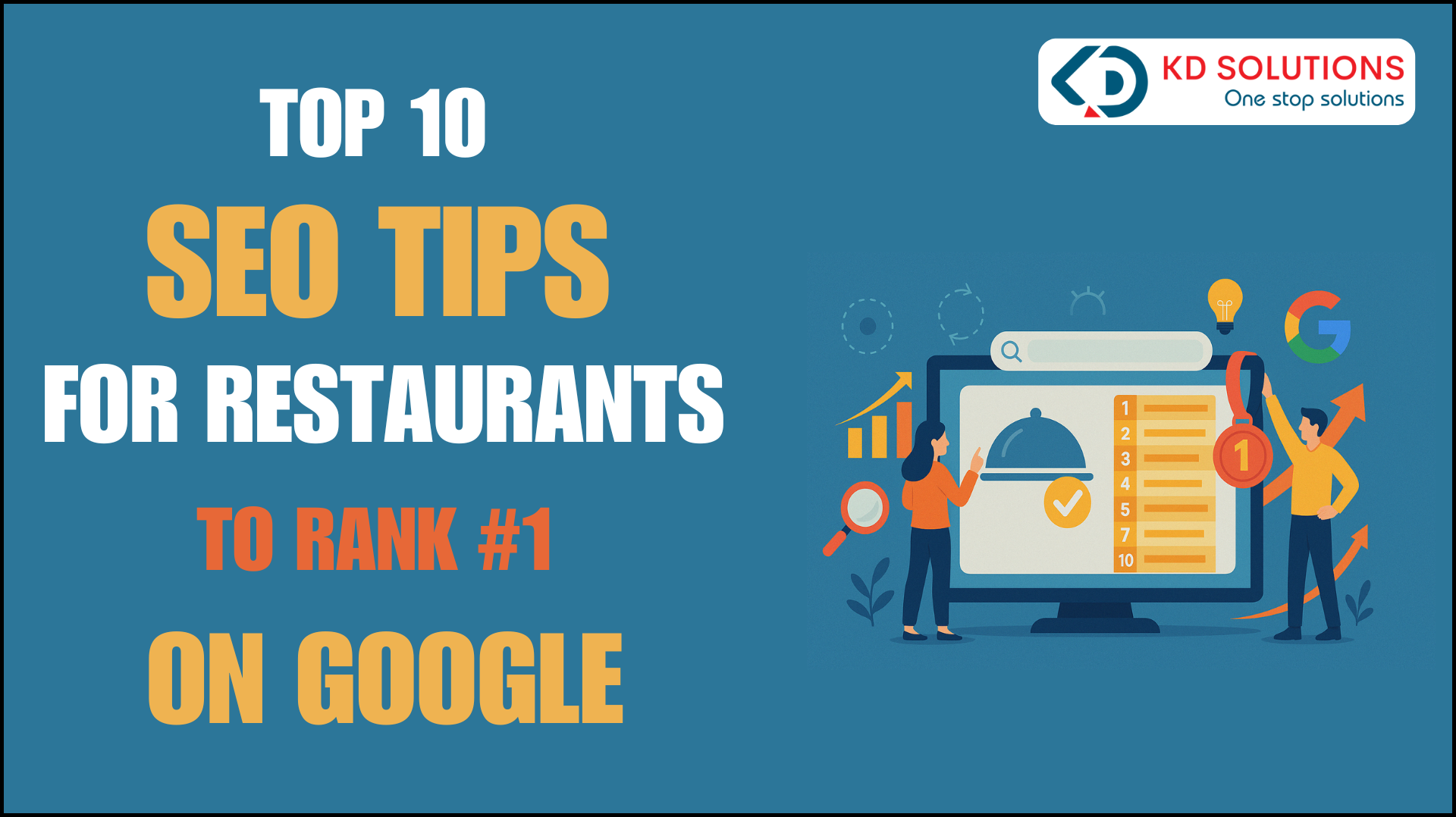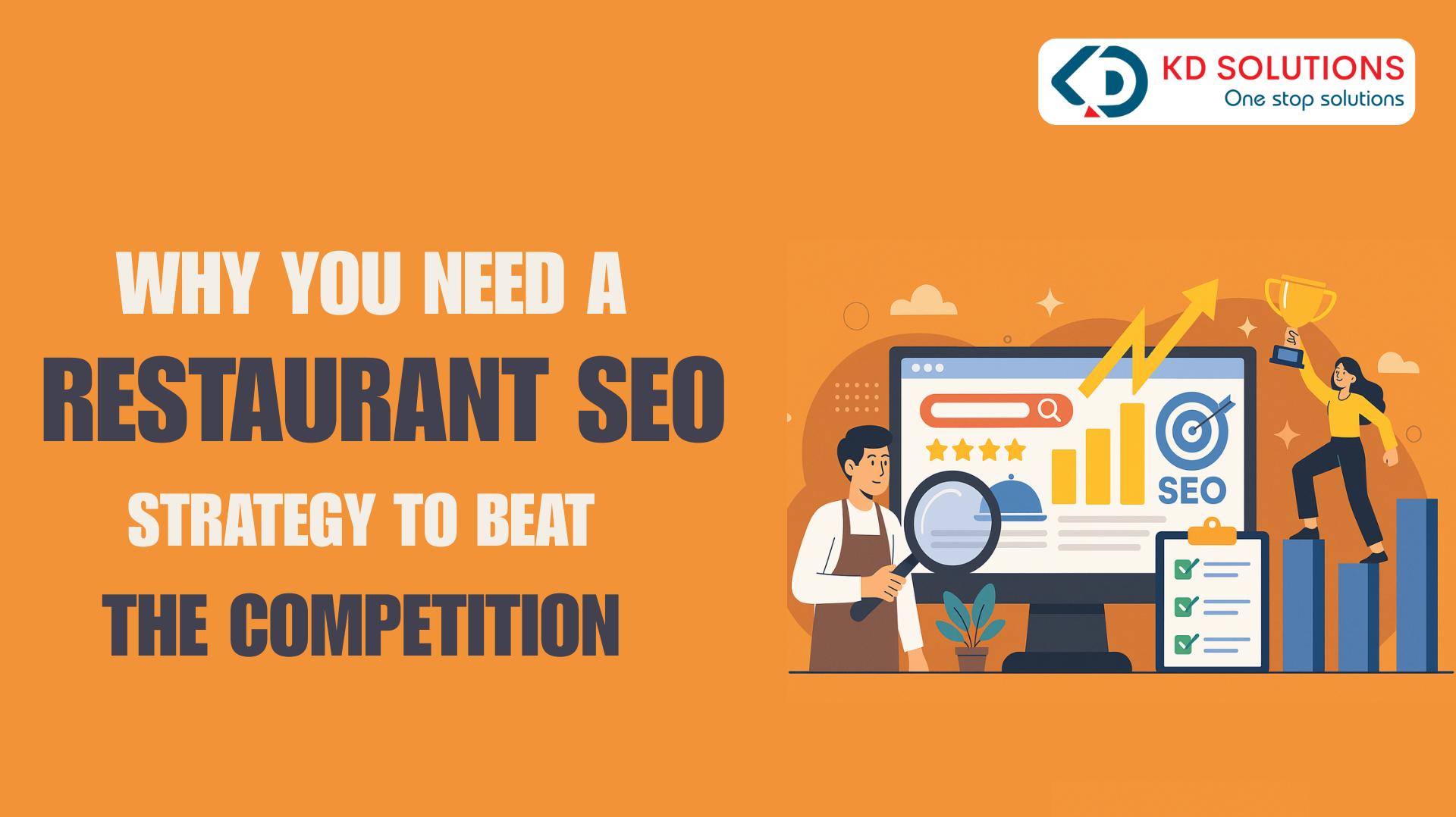In today’s digital world, where most customers search for “restaurants near me” before deciding where to eat, having a strong online presence is no longer optional—it’s essential. Search Engine Optimization (SEO) is the most effective way for restaurants to appear at the top of Google’s search results. Whether you’re running a small bistro or a large dining chain, implementing solid SEO strategies can drive more traffic, fill more tables, and boost your revenue.
Let’s explore the top 10 SEO tips for restaurants to help you rank #1 on Google—presented in an easy-to-understand, paragraph-wise format for practical application.
Optimize Your Google Business Profile for Local Search
One of the most powerful tools in your local SEO toolkit is your Google Business Profile (formerly Google My Business). This free listing puts your restaurant on Google Maps and makes you visible to local diners searching for food nearby.
Make sure your profile is complete with accurate business name, address, and phone number (NAP). Add high-quality images of your food and interior, mention your cuisine type (e.g., Indian, Italian), and update your operating hours. Also, encourage happy customers to leave reviews—Google values this social proof for local ranking.
Use Local Keywords Strategically in Your Website Content
To attract diners in your area, you need to speak their language—and that means using local keywords. These are search phrases that include your location, such as “best Italian restaurant in Harrow” or “Indian restaurant near Oxford Street.”
Add these keywords naturally into your homepage, service pages, meta titles, descriptions, and blog content. Don’t forget your image ALT tags too. By doing this, search engines will understand where your restaurant is located and what you offer—making it easier to rank locally.
Create Dedicated Location Pages (If You Have Multiple Outlets)
If your restaurant operates in more than one location, don’t lump all your information on a single page. Instead, create individual landing pages for each branch or city you serve. These pages should include the address, contact details, menu variations, and nearby landmarks.
Each location page should be optimized with local keywords and unique content—Google hates duplicate content, so make sure each page is tailored. This helps you rank separately in different city searches and capture location-based traffic.
Invest in High-Quality On-Page SEO
On-page SEO includes all the elements on your website that help search engines understand and rank your content. This includes meta tags, header tags, keyword placement, internal linking, and image optimization.
Ensure each page of your website has a unique title tag and meta description that include relevant keywords like “authentic Thai restaurant in Ahmedabad” or “best rooftop dining in London.” Use proper H1 and H2 tags, and structure your content for clarity. An SEO-friendly site makes both users and Google happy.
Improve Website Speed & Mobile Responsiveness
According to Google, mobile-friendliness and page speed are critical ranking factors—especially for restaurants, since many users search on the go. If your site takes too long to load or isn’t mobile-optimized, you’ll lose potential customers and rankings.
Use tools like Google PageSpeed Insights or GTmetrix to test your site speed. Compress images, enable caching, and use a reliable hosting provider. Also, ensure your site design is responsive—it should work flawlessly on smartphones, tablets, and desktops.
Leverage Structured Data for Rich Snippets
Adding schema markup (structured data) to your website helps Google understand your content better and can lead to rich results—like displaying your star rating, price range, opening hours, and more directly in the search results.
For restaurants, using “Restaurant schema” can significantly boost visibility and click-through rates. With proper markup, Google may even show your upcoming events, menus, or reviews directly on the SERP (Search Engine Results Page), making your listing stand out.
Regularly Publish SEO-Optimized Blog Content
Blogging is a powerful tool for improving your SEO and connecting with your audience. Regularly publish posts about food trends, behind-the-scenes stories, chef interviews, or “top dishes to try this season.” Make sure these blogs are optimized with relevant keywords and internal links.
For example, a blog titled “Top 5 Street Foods to Try in Harrow” can target users looking for casual eats nearby. Over time, quality blogs help you rank for long-tail keywords and build topical authority.
Build Local Citations & Listings
Being listed on trusted local directories helps build credibility and increases your chances of ranking on Google’s local pack. Submit your restaurant to platforms like Yelp, Zomato, TripAdvisor, Justdial, and local business directories relevant to your city.
Ensure your NAP (name, address, phone) is consistent across all listings. These local citations signal to Google that your business is trustworthy and relevant to local users—an important factor for local SEO.
Encourage Reviews & Manage Your Online Reputation
Reviews aren’t just social proof—they’re a ranking factor. Encourage your happy customers to leave reviews on your Google Business Profile, Facebook, and review platforms. The more positive reviews you collect, the higher your chances of appearing in local packs.
But it’s not just about collecting them—respond to all reviews, even the negative ones, professionally. Google sees this as active engagement, which can help your SEO service efforts by improving trustworthiness and click-through rates.
Use an Experienced SEO Agency for Long-Term Growth
SEO isn’t a one-time task—it’s a long-term investment that requires constant updates, analysis, and optimization. That’s why many restaurants choose to partner with an experienced SEO agency that understands the unique challenges and opportunities in the food industry.
A professional SEO partner can help with keyword research, backlink strategies, competitor analysis, and technical SEO—all tailored to restaurant growth.
Why KD Solutions is the Best Restaurant SEO Company in Ahmedabad, India
If you’re looking for expert help to boost your restaurant’s SEO, KD Solutions stands out as the best restaurant SEO company in Ahmedabad, India. With deep experience in the hospitality industry, KD Solutions offers tailored SEO services that combine technical expertise with a creative content strategy to deliver real results.
Whether you need local SEO optimization, content marketing, or full SEO audits, KD Solutions ensures your restaurant ranks high on Google and gets discovered by hungry diners right when they’re searching.
From keyword-rich blogs to Google Maps optimization and high-authority backlink building, their restaurant SEO strategy covers every angle to help your business dominate search results.
Final Thoughts
The restaurant industry is more competitive than ever. With so many diners relying on Google to decide where to eat, ranking on the first page can make or break your business. Implementing smart, consistent SEO strategies can lead to more visibility, footfall, and ultimately, more revenue.
Whether you’re a fine dining restaurant, casual café, or food truck, following these top SEO tips will help you stay ahead of the curve. And if you want to save time and see faster results, partnering with a skilled SEO agency like KD Solutions is the smartest move you can make.
SEO isn’t just about clicks—it’s about conversions, reputation, and building a lasting digital presence that fuels your restaurant’s success.
FAQs
Restaurant SEO (Search Engine Optimization) involves optimizing your restaurant’s online presence to appear higher in search engine results. It’s crucial because most customers use Google to search for restaurants nearby. Better rankings mean more visibility, more website traffic, and ultimately more diners at your tables.
Start by creating or claiming your Google Business Profile, adding accurate contact info, photos, menus, and customer reviews. Then optimize your website with local keywords, structured data, and responsive design. Regular blog content and local directory listings will also improve visibility on Google.
Key SEO factors include:
- Accurate local listings (NAP consistency)
- Mobile-friendly and fast-loading website
- Optimized Google Business Profile
- High-quality local backlinks
- Keyword-rich content and blogs
- Customer reviews and engagement
Use keywords that combine your cuisine, location, and service type. For example, “best Italian restaurant in Ahmedabad” or “family dining in Harrow.” Place them naturally in your website meta titles, descriptions, headings, image tags, and blog content.
Yes! Blogging regularly with SEO-optimized content helps you rank for long-tail keywords and establishes authority. It also keeps your website fresh, which Google rewards with better rankings. Topics like “top dishes to try” or “events at our restaurant” are great for content marketing.
SEO is a long-term strategy. You may start seeing initial improvements in 2–3 months, but consistent efforts typically bring noticeable results in 4–6 months. Faster results can be achieved by working with an experienced SEO agency like KD Solutions.
Reviews boost credibility and are a ranking factor for local SEO. Positive reviews can increase your click-through rate on Google and influence customer decisions. Always encourage satisfied customers to leave reviews on Google and respond to them actively.
Yes, especially if you lack time or technical expertise. An SEO agency like KD Solutions, the best restaurant SEO company in Ahmedabad, offers expert strategies tailored to restaurant businesses—helping you rank higher, attract more local customers, and grow your brand online.
Local SEO focuses on optimizing your online presence for searches based on location—like “restaurants near me.” It emphasizes Google Maps visibility, local directories, and reviews. Regular SEO is broader and targets general keyword rankings, while local SEO helps drive in-person visits.
Absolutely. With the right SEO strategy, you can appear at the top of search results when potential customers are searching for places to eat. This visibility gives you an edge over competitors who are not optimizing their websites or Google Business listings.






